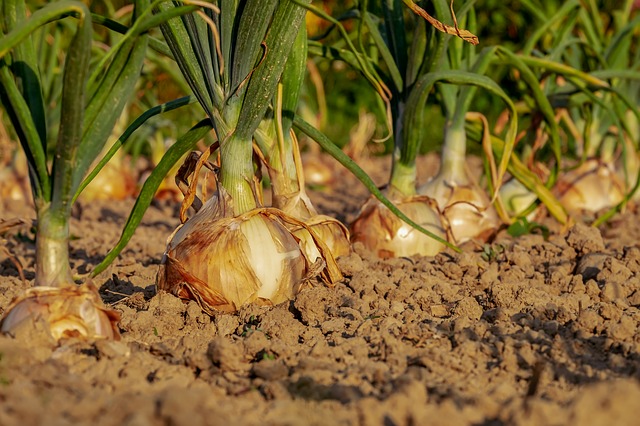By Bill Phillips, Web Content Specialist, AgReserves (August 15, 2023)*
Traci Jensen is the general manager at River Point Farms, an onion packer and processor that is one of the flagship operations in the Row Crops Division of AgReserves, an agriculture investment company that operates farms and ranches throughout North America as well as in South America and the UK.
River Point Farms, located in Hermiston, Oregon, supplies onions to many food service and industrial customers. “If you buy Tostitos salsa, there’s a good chance you’re getting our onions,” Jensen said. “If you’re eating at Chipotle, you’re eating River Point onions, most likely.”
Jensen has been general manager at River Point Farms (RPF) for the past three years, where she makes sure food safety is the priority: “I think food safety is the most important thing. … We can produce all the pounds we want, but at the end of the day, if we don’t do it in a manner that protects those consuming our products, that’s our brand and reputation on the line.”

It helps that all the onions come from a single source – RPF’s sister operation, AgriNorthwest – just across the Columbia River in southeast Washington. While Jensen admits she may get too involved with day-to-day things, she is an important link between the pack facility, fresh-cut facility, and the farm. “We have coordination,” said Jensen, who has been at RPF for eight years. “It’s important, because we have the two operations, that there is someone who can make that connection among all the departments. I’m the cog in the middle of the wheel, and they’re all the wheel parts.”
Before joining RPF, Jensen was the food safety manager for almost 17 years at a large frozen vegetable processing company, where her father was the operations manager. “I learned a lot from him,” she said. “While my role was food safety, I would pick his brain every day about why we did things operationally just so I understood all that.”
We spoke to Jensen to learn more about food safety.
1) The CDC estimates that each year one in six Americans get sick from contaminated food or beverages and 3,000 die from foodborne illness. The U.S. Department of Agriculture estimates that foodborne illnesses cost the U.S. more than $15.6 billion each year. Tell us about the food safety program at River Point Farms and how it goes beyond what is required.
River Point Farms has always been a leader in our industry. We are looking at food safety, not just in our own operation, but in other industries, and integrate that into our food safety programs. Since we have both a pack and a fresh-cut operation, sometimes the things we do for the fresh-cut facility, we wouldn’t necessarily need to do at the pack facility. But because we’re integrated, we do some additional things there, and are always looking to mitigate food safety risk in everything we do.
We’re doing pathogen testing on every 25 acres of product that we grow before we ever bring it into our facilities. We’re doing over 100 environmental swabs per week, which is, I would say, very robust in that realm. When we built the new fresh-cut facility in 2021, we built it thinking about food safety in every way we could. We picked the best, most food-safe equipment, thought about how our employees were going to interact with the product, and combined best practices from around the world where we saw different food safety mitigation steps, and brought them all together in one facility. So, food safety is always at the forefront of whatever we’re doing.
2) How did things change – if at all – during COVID?
Because we had a strong, robust food safety program, we were already very diligent in sanitizing our hands, wearing masks, wearing smocks, and those types of protective measures. We did have to adjust some of the closer interactions, such as how our team members inspected the product on conveyors, keeping in mind that we couldn’t separate employees by adding the clear plexiglass that was used in supermarkets, or they couldn’t efficiently complete their jobs. It made us think outside the box a little bit… but we did have comprehensive systems already in place, so it worked out. Plus, as a food-manufacturing facility, our employees were still expected to physically be at work each day, but we took more measures to ensure that they were healthy when they came to do their jobs.
3) A benefit of your upgraded facilities has been more efficient energy use, which has led to annual savings of more than half-a-million kilowatt hours, as well as some nice rebates. Since managing energy use is an important part of environmental stewardship, can you tell us about your energy savings and how other companies can do the same things?
We worked with a professional engineer with Energy Smart Industrial to evaluate the changes that we had done or improvements that we had implemented as far as VFDs (a type of motor drive that controls speed and torque by varying the frequency of the input electricity), air compressor efficiencies, and adaptive refrigeration controls. We earned a rebate from Benton Rural Electric Association, thanks to the improvements and energy efficiency updates that we implemented. I think there are always opportunities to be gained. Even just looking at lighting… we did a lighting project where we went back through our pack facility, which isn’t really that old – it was built in 2017 – but we were able to upgrade some lighting, and we were able to claim some rebates. It is important, and very beneficial, to partner with your local utility when an upgrade is being completed or a process is being evaluated. The project may already be eligible for a rebate, or a small change in the project could be made to gain some of the rebates available. Involving them early in the process is key.
4) Food safety is important to you, but if you were to ask high school girls what they want to do, few are likely to say they want to go into food safety. How do you get young people involved in and excited about food safety?
I think that food safety is very science-based. And that’s what was exciting to me about it – the connection to food science and technology. When I went to college, there were a lot of opportunities within the food safety, food science, and technology realm, such as in R&D, food law, food safety, and quality assurance. The fun thing about food safety is oftentimes it’s about finding a root cause, or mitigation of risk through looking at processes, which tends to be engineering-based where you must methodically examine your process. Then, you bring in the science of the microorganisms that you’re dealing with and understanding those microorganisms, which is attractive to those interested in microbiology. You also have some chemistry components depending on what kind of food you’re processing. A career in food safety requires so many of the sciences that much of my STEM background covered, and I use it every single day.
5) What are some reasons to be encouraged about food safety in the coming years?
Food safety has evolved considerably. When I think about where we’ve come from and where we are today, there is a lot to be encouraged about. Prior to the 1960s, we didn’t have systems in the food processing industry to evaluate food safety. NASA wanting to send a man to the moon and looking for how to supply safe food was the start of food safety systems. This was followed by the FDA Food Safety Modernization Act of 2011. And so, thinking about what happened over those 50 or 60 years, we have come a long way.
How do we now take it to the next level? I think there are many opportunities for us to continue to use risk analysis in our processes and continue to look for ways to make our food supply safer. There continues to be new microorganisms that pop up that haven’t previously been a concern that now are, and this requires investigating and developing new testing and technology. I think that food safety initiatives and issues will always be evolving and ever-changing.
6) When you look back on your journey or think about the next generation of women in agribusiness, do you see specific advantages that women have, or challenges that women must overcome?
I believe that there are less obstacles to overcome today than at any time previously. As women, we must continue to be willing to allow ourselves to be vulnerable. I wouldn’t be where I am today if I hadn’t believed in myself and proven that I had the skills and work ethic to be successful in every position that I have undertaken. I would say to the next generation of women in agribusiness: learn to be a critical thinker, solution-based, and process-oriented. With those skills you will be able to do great things.

ABOUT THE AUTHOR
Bill Phillips is a web content specialist, writer, and producer at AgReserves, Inc. Previously, he worked in print and online journalism in newsrooms in Southern California and Salt Lake City.
* This article was reprinted with permission from Women in Agribusiness Today blog.





